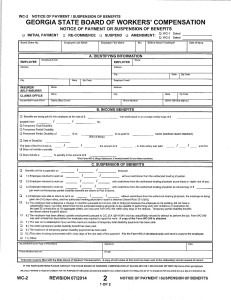Drug testing in Georgia workers’ compensation cases has become more common. Drug testing usually takes two forms.
The first type of drug testing is done shortly after a work injury occurs. This type of testing can be used to deny your entire workers’ compensation claim on the grounds that your injury was caused by willful misconduct.
Drug and Alcohol Testing After a Work Injury
Whenever a work injury occurs in Georgia, most employers will send you to a medical clinic for evaluation and treatment. The medical staff will almost always perform drug and alcohol testing.
This is done because the law in Georgia allows employers to deny benefits when they can prove you are intoxicated. In fact, it is important for you to know that the refusal to submit to a drug test can create a presumption that a work injury was caused by your drug or alcohol use. So, if you do not take the test when asked, you may have to prove that you were not intoxicated.
 Proving an Intoxication Defense
Proving an Intoxication Defense
If you take the test and the results show drugs or alcohol in your system, it may create a presumption that your injury was caused by alcohol or drug use. However, the employer has to meet some specific requirements to establish this presumption:
- The testing must actually done within a certain time of the accident occurring.
- The test must show an alcohol level above .08 or the presence of marijuana or another improperly used controlled substance.
Proving Intoxication Did Not Cause Your Work Injury
What happens if the presumption is established? It is important to understand that this presumption is “rebuttable”. That means that it is not the end of your case.
You can have a hearing with a Georgia workers’ compensation judge to determine if your injury actually was caused by drug or alcohol use. If you hire an attorney and request a hearing, your employer will have the burden of proving its defense in court.
New rules regarding drug testing in Georgia
Drug testing also takes place when doctors prescribe medication for you to treat your injuries. In recent years, this testing has increased. This increase is an attempt to crack down on people who are illegally taking or selling prescription drugs.

One situation where these new rules have an effect is when a patient is being treated with medication for chronic pain lasting more than 3 months. This often happens in workers’ compensation cases because severe back, leg and arm injuries can cause chronic pain.
Under the new rules, doctors are required to monitor compliance with treatment. There are a few different methods a doctor can use to monitor compliance. One is drug testing. Another is the Georgia Prescription Drug Monitoring Program. There are other monitoring options the doctor can use as well.
Problems that come from failing a drug test
It is very important to listen to your doctor and to take your medications as prescribed. Failing to do so could harm you.
If you are in pain management treatment, your doctor will probably have you sign an agreement saying that you are going to take the medications as prescribed. The agreement will also say that you are not going to get medications from any other physician.
If a drug test shows that you may have violated this agreement, many doctors will discharge you as a patient. A discharge can cause real problems with your workers’ compensation case because of the rules about what doctors you can treat with for your injury.
What can be done if you fail a drug test and are discharged by your doctor
If you fail a drug test or get discharged from treatment by a pain management doctor, it does not mean your workers’ compensation case is over. But getting kicked out of treatment obviously affects the medical treatment you are receiving. It can also affect your entitlement to weekly workers’ compensation benefits.
 Proving an Intoxication Defense
Proving an Intoxication Defense








